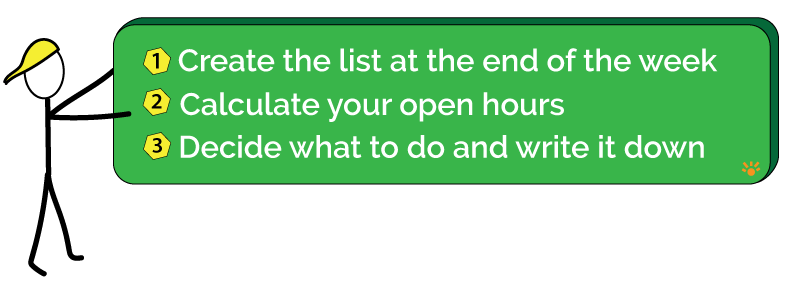Weekly Planning: 3 Must Dos & 2 Must Nots
[Reading time: 1 minute 30 seconds]
I've never seen a weekly plan work without these three things in place:
- Create the plan at the END of the week
You only need about 20 minutes. Spend the time at the very end of your work week so you don't take up any space in your memory with work details during your personal time. A weekly plan will give your upcoming week a solid focus AND will support your subconscious mind as it works behind the scenes to get things done for you.
TIP: Spend your last 20 minutes on Friday creating the plan for the upcoming week. - Calculate your open hours
Take a look at how many hours you've committed to meetings and/or appointments in the upcoming week. Include travel time! What you're after here is the total number of open hours you have each day - and for the whole week. Be accurate. Don't ballpark your number of open hours.
When you get to the next step, you're going to make a list of what you want to get done but the trick is to only use 3/4 of your open hours. This is because you need to save time for everyday things like answering emails and phone calls.
TIP: If your job requires you to be available for any incoming phone calls or clients/customers, you might only be able to plan for using half of your open hours. - Decide what you want to get done and write it down
When you write something down, also include how long you think it will take to get it done. Be realistic. The goal here is under-promise and over-deliver so at the end of the week, you get the satisfaction of seeing everything on your weekly plan completed and scratched off the list.
NOTE: People with strong Goal-Directed Persistence are driven to get a lot of things done. It's not uncommon for them to think "I'm sure I can get these ten things done in [xx] minutes." If that's you and you're often wrong about how long it takes to get things done, be aware that your brain is going to want to write down too much.

Here are two big pitfalls that you'll want to avoid:
- Don't let your weekly plan morph into a GIANT MASTER LIST.
You may find that when you write out your weekly list that you start putting everything on it. If you find that you're writing down so much stuff that no human being could ever get it done in a week, that's a signal from your brain that it's overloaded.
Check out step #1 in the blog post "Are you Overloaded by Work...?" - Don't assign a task to a particular day.
Weekly planning is about doing your "big thinking" once. On Friday when you create your weekly plan, it may sound good to do the X task on Tuesday and the Y task of Thursday but that doesn't allow for any flexibility. What happens if Tuesday comes around and something else needs your attention?
Creating a weekly plan means you can give your brain a break from work over the weekend. Don't make yourself try and remember work when you want (and need) to be present in your personal life. Writing down a plan for the upcoming week will help you keep your work thoughts at work!
![]()
Why support the brain?
Because the brain is what is driving our day! Our ability to focus, filter distractions, and plan comes from the strength (or weakness) of various brain skills. If the brain skill of Planning isn't strong, it can be tough to get things done. Likewise, if the brain skill of Working Memory is decreasing, it gets harder to even remember all the things that need to get done.
The GoBrainGo approach is to show you how your brain works and then give you the tools and strategies that support each of the brain skills. Don't let weak skills stop you from accomplishing things.
Stay Connected
Join our mailing list to receive new blog posts.
Don't worry, your information will not be shared.
We hate SPAM. We will never sell your information, for any reason.



